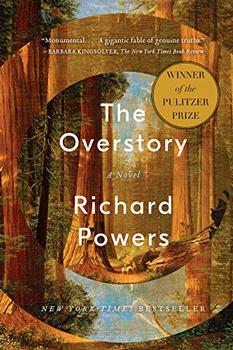Summary | Excerpt | Reading Guide | Discuss | Reviews | Beyond the Book | Readalikes | Genres & Themes | Author Bio

A Novel
by Richard Powers
The pitiless winter of '62 tries to take another baby. It settles for one of the trees. The oldest child, John, destroys another, the summer after. It never occurs to the boy that stripping half the tree's leaves to use as play money might kill it.
Hoel yanks his son's hair. "How do you like it? Hm?" He cracks the boy with his open palm. Vi must throw her body in between them to stop the beating.
The draft arrives in '63. The young and single men go first. Jørgen Hoel, at thirty-three, with a wife, small children, and a few hundred acres, gets deferred. He never does help preserve America. He has a smaller country to save.
Back in Brooklyn, a poet-nurse to the Union dying writes: A leaf of grass is no less than the journey-work of the stars. Jørgen never reads these words. Words strikes him as a ruse. His maize and beans and squash—all growing things alone disclose the wordless mind of God.
One more spring, and the three remaining trees burst out in creamcolored flowers. The blooms smell acrid, gamy, sour, like old shoes or rank undergarments. Then comes a thimbleful of sweet nuts. Even that small harvest reminds the man and his exhausted wife of the falling manna that brought them together, one night in the woods east of Brooklyn.
"There will be bushels," Jørgen says. His mind is already making bread, coffee, soups, cakes, gravies—all the delicacies that the natives knew this tree could give. "We can sell the extra, in town."
"Christmas presents for the neighbors," Vi decides. But it's the neighbors who must keep the Hoels alive, in that year's brutal drought. One more chestnut dies of thirst in a season when not even the future can be spared a drop of water.
Years pass. The brown trunks start to gray. Lightning in a parched fall, with so few prairie targets tall enough to bother with, hits one of the remaining chestnut pair. Wood that might have been good for everything from cradles to coffins goes up in flames. Not enough survives to make so much as a three-legged stool.
The sole remaining chestnut goes on flowering. But its blooms have no more blooms to answer them. No mates exist for countless miles around, and a chestnut, though both male and female, will not serve itself. Yet still this tree has a secret tucked into the thin, living cylinder beneath its bark. Its cells obey an ancient formula: Keep still. Wait. Something in the lone survivor knows that even the ironclad law of Now can be outlasted. There's work to do. Star-work, but earthbound all the same. Or as the nurse to the Union dead writes: Stand cool and composed before a million universes. As cool and composed as wood.
THE FARM SURVIVES the chaos of God's will. Two years after Appomattox, between tilling, plowing, planting, roguing, weeding, and harvesting, Jørgen finishes the new house. Crops come in and are carried off. Hoel sons step into the traces alongside their ox-like father. Daughters disperse in marriage to nearby farms. Villages sprout up. The dirt track past the farm turns into a real road.
The youngest son works in the Polk County Assessor's Office. The middle boy becomes a banker in Ames. The eldest son, John, stays on the farm with his family and works it as his parents decline. John Hoel throws in with speed, progress, and machines. He buys a steam tractor that both plows and threshes, reaps and binds. It bellows as it works, like something set free from hell.
For the last remaining chestnut, all this happens in a couple of new fissures, an inch of added rings. The tree bulks out. Its bark spirals upward like Trajan's Column. Its scalloped leaves carry on turning sunlight into tissue. It more than abides; it flourishes, a globe of green health and vigor.
And in the second June of the new century, here is Jørgen Hoel, in bed in an oak-trimmed upstairs room of the house he built, a bedroom he can no longer leave, looking out the dormer window onto a school of leaves, swimming and shining in the sky. His son's steam tractor hammers down in the north forty, but Jørgen Hoel mistakes the sounds for weather. The branches dapple him. Something about those green and toothy leaves, a dream he once had, a vision of increase and flourishing, causes a feast to fall all around his head again.
Excerpted from The Overstoryby Richard Powers. Copyright © 2018 by Richard Powers. With permission of the publisher, W. W. Norton & Company, Inc. All rights reserved.
Your guide toexceptional books
BookBrowse seeks out and recommends the best in contemporary fiction and nonfiction—books that not only engage and entertain but also deepen our understanding of ourselves and the world around us.